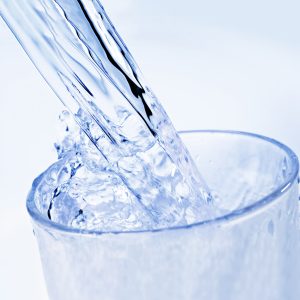16.7 The Basics of Water
The Importance of Water
Water is an essential nutrient and our bodies couldn’t survive long without it. Making up about 60% of adult body weight, water maintains vascular volume, helps regulate body temperature, transports nutrients and waste products throughout the body, participates in energy formation, provides a medium for chemical reactions in the body, and is required for cellular homeostasis. Dehydration occurs when the amount of water in the body drops too low to properly carry out all of its important metabolic functions (Institute of Medicine, 2006). Dehydration can cause (Institute of Medicine, 2006; Manz, 2007; Popkin, D’Anci, & Rosenberg, 2010):
- Fatigue
- Headache
- Irritability
- Impaired cognitive function, including alertness, concentration, confusion, and short-term memory
- Impaired visual and motor skills
- Hindered exercise performance by affecting motivation, perceived effort, endurance, and core temperature
- Reduced skin elasticity
- Constipation
- Kidney stones
- Fainting (in susceptible people)
- Increased resting heart rate
- Impaired ability to maintain blood pressure
- Increased risk of life-threatening heat stroke
How Much Fluid We Need and What Counts
Consuming adequate fluid on a daily basis prevents dehydration and is important for normal healthy functioning. 3.7 liters—or approximately 125 ounces—per day is considered adequate for most adult males and 2.7 liters—or approximately 90 ounces—per day for most adult females; however, fluid needs vary somewhat person-to-person, depending on age, sex, climate and heat exposure, medical conditions, and activity level (Food and Nutrition Board, Institute of Medicine, National Academies, 2005). For example, more fluid is needed if physically active (Institute of Medicine, 2006).
We can get the fluid our bodies need from (Institute of Medicine, 2006; Kolasa, Lackey, & Grandjean, 2009; Popkin et al., 2006; Silva et al., 2013; Killer, Blannin, & Jeukendrup, 2014):
- drinking water—whether it be soft or hard, spring or well, carbonated or distilled;
- other beverages, including juice, milk, and even coffee and caffeinated beverages;
- soup broths; and
- foods with high water content, such as fruits and vegetables like melons, grapes, tomatoes, lettuce, and celery.
While all of these contain water, keep in mind that some beverages contain added sugars and saturated fat without offering much nutritional value. Soda, energy drinks, specialty coffee drinks, fruit punch, lemonade, and other “juice drinks” are all examples. Therefore, it’s recommended that we prioritize water.
When it comes to how much water or other fluids to drink, the Institute of Medicine says to let thirst be your guide (2006). Note that feeling hungry can actually be a sign of thirst.
In general, daily fluid intake should be approximately proportional to daily fluid losses, through sweat and urine, for example (Institute of Medicine, 2006). One way to gauge whether or not you’re consuming enough fluids is to check the color of your urine: if it’s clear or light in color, then you’re probably sufficiently hydrated; if it’s dark and has a strong smell, then that’s a sign that you should probably be drinking more fluids. Further, consider how often you urinate: if it’s infrequent—one or two times in a 12-hour period—that could also be a sign of inadequate fluid intake. Most healthy people urinate about six to seven times per 24 hours, but anywhere from four to 10 times is generally considered normal (Bladder and Bowel Foundation, 2014).
Is It Possible to Drink Too Much Water?

While it is possible to drink too much water, this is extremely rare and not likely to occur among most healthy people as long as fluid intake is approximately proportional to fluid losses. The body is generally able to excrete excess water to maintain water balance, except in the case of rapid consumption of unusually large quantities of fluids that greatly exceed the kidney’s maximal excretion rate. Excessive fluid intake can lead to a condition called hyponatremia, which is a low concentration of sodium in the blood that leads to central nervous system edema, lung congestion, and muscle weakness (Institute of Medicine, 2006). However, as we’ve mentioned, this is extremely rare; most of us probably need to drink more water, not less.
Self-Assess Your Understanding
- What is the role of water?
- List sources of water.
- List the issues or health concerns dehydration can lead to.

